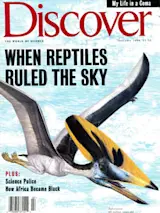Life, liberty, and the pursuit of happiness. The Declaration of Independence holds these rights to be self-evident, unalienable. In the eighteenth century, when the words were written, they were called natural rights; today we call them human rights.
Whatever we call these rights, it has long seemed obvious to most people that only human beings have them. But now a group of human beings-- headed by philosopher Peter Singer and backed by a number of prominent anthropologists, biologists, lawyers, psychologists, and ethicists--has challenged our basic assumptions on the subject, insisting that we reconsider this limitation. In the preface to their book, The Great Ape Project, they set forth a Declaration on Great Apes. "We demand the extension of the community of equals to include all great apes: human beings, chimpanzees, gorillas, and orangutans," they write. " 'The community of equals' is the moral community within which we accept certain basic ...














